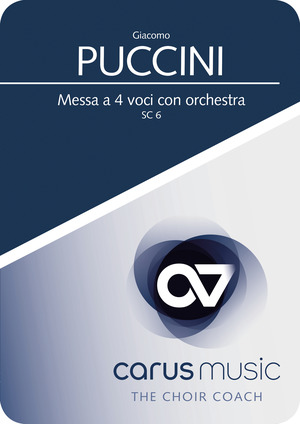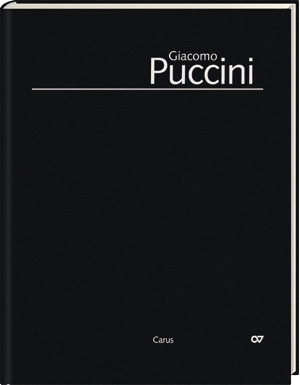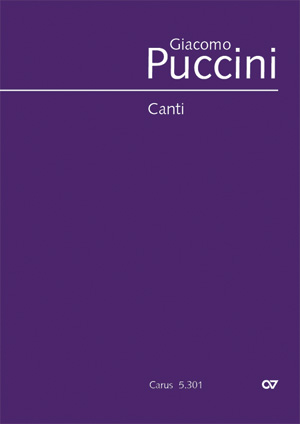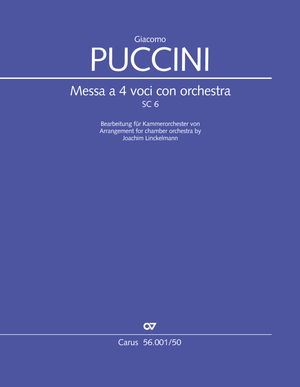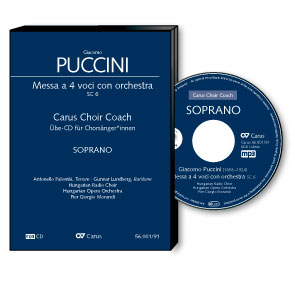
Messa a 4 voci con orchestra
Edizione Nazionale delle Opere di Giacomo Puccini, III/2 SC 6
The Messa a 4 voci was composed by the 22-year-old Giacomo Puccini at the end of his schooldays, and revised about 15 years later. Even in this early work, the subtlety of writing found in Puccini’s later operas is clear, works in which he re-used some themes from the mass. The Messa a 4 voci sparkles with vitality, and even this youthful, dynamic, but demanding work requires a thorough knowledge of the piece by the choral singers.
The Carus Choir Coach offers choir singers the unique opportunity to study and learn their own, individual choral parts within the context of the sound of the entire choir and orchestra. For every vocal range a separate Audio CD or MP3 and download containing each choir part is available. The Carus Choir Coach is based on recorded interpretations by renowned artists who have performed the work from carefully prepared Carus Urtext editions. Each choir part is presented in three different versions:
- Original recording
- Coach: each part is accompanied by the piano, with the original recording sounding in the background
- Coach in slow mode: the tempo of the coach slows down to 70% of the original version – through this reduction passages can be learned more effectively.
Performers: Antonello Palombi (tenore), Gunnar Lundberg (basso) – Hungarian Radio Choir, Hungarian Opera Orchestra – Pier Giorgio Morandi
Contents
-
Composer
Giacomo Puccini
| 1858-1924Giacomo Puccini came from a dynasty of church musicians who worked in the Tuscan city of Lucca. His Messa a 4 con orchestra, premiered there in 1880, seemed to point him toward a career in the same direction, but directly after this, he went to Milan Conservatoire with the aim of becoming an opera composer. His only independent orchestral works were written there as student works – the Preludio sinfonico (1882) and Capriccio sinfonico (1883), as well as some of his 16 complete surviving songs for voice and piano (Canti), which he composed, with frequent references to his operas, almost throughout his career. He achieved a breakthrough as an opera composer with Manon Lescaut (1893); between 1893 and 1904 he composed La Bohème, Tosca and Madama Butterfly, which remain his most frequently-performed works today. In recent years there has been a growing realisation that Puccini's entire output requires reappraisal. And so, he has increasingly come to be understood as a musician searching for a way forward into the modern age. Personal details
-
Vocal score arranger
Paul Horn
| 1922-2016Paul Horn war ein deutscher Kirchenmusiker, Organist, Komponist und Musikwissenschaftler. Er studierte Kirchenmusik und Orgel an der Evangelischen Kirchenmusikschule Esslingen am Neckar bei Hans-Arnold Metzger und Musikwissenschaft, Theologie und Geschichte an der Universität Tübingen. Seine berufliche Laufbahn begann als Kantor an der Evangelischen Michaelskirche in Stuttgart-Degerloch. 1954 wurde er Kantor an der Evangelischen Stadtkirche Ravensburg, eine Position, die er bis zu seiner Pensionierung innehatte. Als Musikwissenschaftler arbeitete Horn bis ins hohe Alter eng mit Carus zusammen. So stammen zahlreiche Carus-Klavierauszüge aus seiner Feder. Personal details
-
Choir
Hungarian Radio Choir
-
Ensemble
Hungarian Opera Orchestra
-
Conductor
Pier Giorgio Morandi
-
Soloist - tenor
Antonello Palombi
-
Soloist - bass
Gunnar Lundberg
Frequent questions about this work
 There are no questions and answers available so far or you were unable to find an answer to your specific question about this work? Then click here and send your specific questions to our Customer Services!
There are no questions and answers available so far or you were unable to find an answer to your specific question about this work? Then click here and send your specific questions to our Customer Services!


